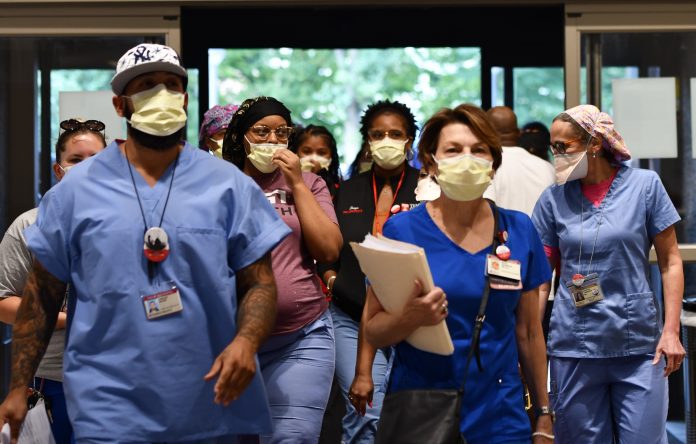By Mary Adamson
In the annual Gallup Poll, nursing has been the No. 1 trusted profession in America for the last 20 years. People love to share their stories of nurses who made a difference in their hospital stays, home visits or trips to the doctor. When I tell folks I’m a nurse, they proudly volunteer that their mom or brother or aunt is a nurse. It is a noble profession.
People believe in us because we are on the frontlines of healthcare every day and every night. No matter when you are admitted, nurses are there.
Hospital administrators are the one group of people I know, however, who turn a deaf ear to bedside nurses. For reasons we don’t understand, administrators seem convinced that our decades of experience at the bedside have taught us nothing about the operations inside the hospital walls, where we work our 12-hour shifts.
A glaring example is our fight for safe staffing. Evidence-based studies have shown that patients have fewer infections, better outcomes and a lower chance of death when a nurse is caring for a safe number of patients. Short staffing also hurts nurses, and we as a group have been sounding the alarm for years about the correlation between short staffing and moral injury.
When a nurse is caring for too many patients, it is impossible to assess patients properly, distribute medications on time, and provide the emotional labor patients need at the most difficult time in their lives. Nurses leave the profession because the hospital industry has created a system that doesn’t allow them to fulfill their calling, not because they are overwhelmed by the work. Many nurses were barreling toward the cliff’s edge prior to 2020, and the pandemic pushed them over that edge. They threw in their scrubs and walked away. Hospitals now claim they can’t provide safe staffing because the shortage of nurses has increased, post-pandemic.
It’s a circular argument – but there is a proven solution. Some 80,000 licensed nurses in the state of Pennsylvania are not practicing in acute care settings. There is no shortage of nurses – just a shortage of nurses who are willing to risk their license in an unsafe environment, or worse, fail to provide the care a patient needs to stay alive.
At Temple University Hospital, we are in contract negotiations. We are proposing patient-care ratios patterned after the system mandated by state law in California. The legislation was passed in 2004 and the pool of nurses increased by 110,000 over the first 10 years. We are certain that a safe working environment will make our hospital a premier place to work. We will increase our labor force and provide the care our patients deserve. Temple could be on the cutting edge of finding a solution to the nursing shortage in Pennsylvania.
Of course, to move this mountain, we’ll need a wholesale change in the dynamics between hospital administrations and the workforce. In a profit-driven system, the nurse is just another resource – an expendable one. Every day, we see evidence that we are not valued.
In the last two months, more than 15 Temple University Hospital nurses have had their cars vandalized while working the night shift. The response from the hospital has been apathetic. There has been no visible increase in security in the parking garage and night shift nurses are on edge. Administrators also park in this lot, but their floor is protected by a keypad. It seems that expense is too much for every door of the parking garage, where all the other healthcare workers park.
Workplace violence is escalating as well. It is Temple Hospital’s position that a physical assault at work is no different than any other workplace injury and there should be no extra time off for the healthcare worker to recover. When that statement was made in our contract negotiations, it was a proverbial slap in the face. Violence should not be accepted as part of the job. Nurses are intentionally excluded in debriefs after a violent episode, even when they were the target of the physical assault. This is another glaring example of the failure to hear us and value our input.
It doesn’t have to be this way. But it has been difficult to convince hospital administrators that they can trust nurses as a majority of Americans have for decades. Because we are unionized at Temple, we get an opportunity every three years to present our proposals. We want a contract that ensures safety, work/life balance and job satisfaction to attract local nurses. Our proposal is designed to recruit and retain nurses and allied professionals. We believe we can restore the 2% turnover rate we were proud of in the past by placing value back into the workforce.
Nurses never work alone. We rely on our co-workers across the hospital and need every department fully staffed to provide quality care. That is why we are fighting shoulder to shoulder with our union siblings in the technical and professional unit to create the conditions they know they need to recruit and retain staff in their specialties.
We have an uphill battle ahead and we need the active engagement of our broader community to restore our healthcare system to one that values patients over profit. Until patients demand a change, profit-motivated corporate healthcare systems will continue buying and running hospitals with no plans to staff them adequately. ••
Mary Adamson is an ICU nurse at Temple University Hospital and the president of the Temple University Hospital Nurses Association, an affiliate of the Pennsylvania Association of Staff Nurses and Allied Professionals. She has been a bedside nurse for more than 25 years.





